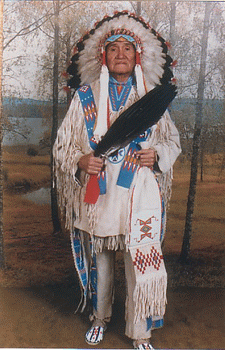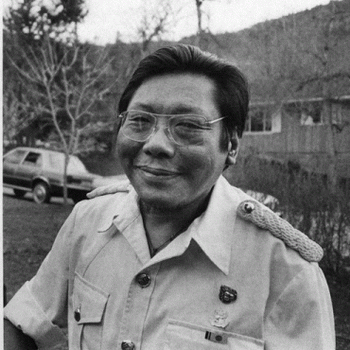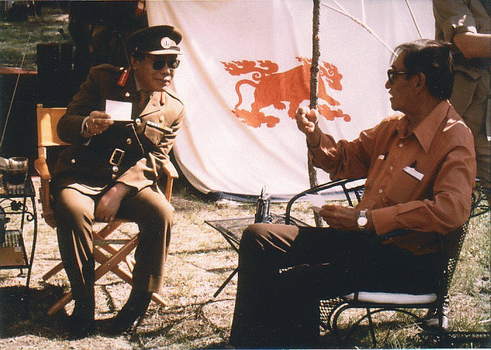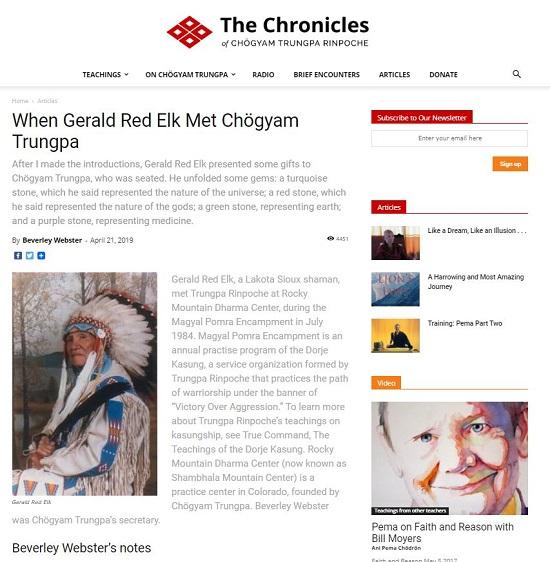When Gerald Red Elk Met Chogyam Trungpa
from: CTR Chronicles


 Rocky Mountain Dharma Center Photo by Andrea Roth 1984
Rocky Mountain Dharma Center Photo by Andrea Roth 1984
Gerald Red Elk, a Lakota Sioux shaman, met Trungpa Rinpoche at Rocky Mountain Dharma Center, during the Magyal Pomra Encampment in July 1984. Magyal Pomra Encampment is an annual practice program of the Dorje Kasung, a service organization formed by Trungpa Rinpoche that practices the path of warriorship under the banner of “Victory Over Aggression.” To learn more about Trungpa Rinpoche’s teachings on kasungship, see True Command, The Teachings of the Dorje Kasung. Rocky Mountain Dharma Center (now known as Shambhala Mountain Center) is a practice center in Colorado, founded by Chogyam Trungpa. Beverley Webster was Chogyam Trungpa’s secretary.
Beverley Webster’s notes
Prior to the meeting, Ani Pema Chodron, Martha Espeset and myself, drove from the encampment grounds down to Rocky Mountain Dharma Center (RMDC) to meet Gerald Red Elk and his adopted nephew Roger La Borde. Rinpoche had asked me to explain a little about the encampment activities, uniforms, etc. I also wanted to introduce him to RMDC and tell him about the center’s activities.
As we were driving into the main compound of RMDC, we spotted Gerald Red Elk and Roger La Borde sitting under a tree with a picnic basket beside them. They told us they had been there for about an hour and had had a leisurely lunch. We then invited them to the dining room where we sat and talked for about 15 minutes. Gerald Red Elk talked about why he had requested to see Chogyam Trungpa. He described the declining situation of his people, as well as the changing of the cycles according to native American tradition. He said that we were now passing out of the Eagle Cycle, and entering the Serpent Cycle. He also said that he thought his people would have difficulty making the transition because of alcohol and drugs.
We drove two cars back up to the encampment ground. Ani Pema Chodron accompanied Gerald Red Elk and Roger La Borde. Martha and I led the way. We parked the cars, and continued on foot, entering the encampment grounds through the main tori gate. I was inclined to describe everything that was visible to Gerald Red Elk. Shibata Sensei was teaching a kyudo class, the shrine tent was being set up, and various activities were taking place throughout. When I looked at Gerald Red Elk, however, he seemed to be taking everything in and not wanting commentary. I was then inclined to describe very little to him.
When we arrived at Rinpoche’s compound, I asked the party to wait while I spoke briefly with Rinpoche. He had previously mentioned that he wanted me to attend the meeting in order to take notes, pending permission from Gerald Red Elk. I suggested that Ani Pema attend and also Dr. Levy, who had expressed a great interest in meeting the shaman. Rinpoche also invited Walter Fordham to join the meeting. A circle of chairs was arranged near Rinpoche’s tent; the party gathered and awaited Rinpoche’s arrival. The shaman was to be seated to Chogyam Trungpa’s left, with Roger La Borde beside him. Gerald Red Elk gave me permission to record the interview, with the warning that the equipment may or may not work, according to the will of the [word omitted]. I therefore prepared myself with pencil and paper.
When Chogyam Trungpa arrived, Gerald Red Elk stood up and the rest of the party followed suit. After I made the introductions, Gerald Red Elk presented some gifts to Chogyam Trungpa, who was seated. He unfolded some gems: a turquoise stone, which he said represented the nature of the universe; a red stone, which he said represented the nature of the gods; a green stone, representing earth; and a purple stone, representing medicine.
As I was fiddling with the suspect tape recorder, the following conversation between Gerald Red Elk and Chogyam Trungpa ensued.
Chogyam Trungpa (CTR): I think it is going to rain tomorrow.
Gerald Red Elk (GRE): I think probably in a few hours.
***
CTR: I think it will rain tomorrow morning.
GRE: I think it will rain soon, you can tell because the clouds are low.
(The first part of the conversation was about Little Joe. Chogyam Trungpa asked Gerald Red Elk if he had known him. Gerald Red Elk said that Ani Pema Chodron had also asked about him about Little Joe, and he had told her that Little Joe had died.)
CTR: He blessed us with feathers and sage.
GRE: We do that too. Unfortunately, our holy men are leaving us. But they finished what they were supposed to do here. I wanted to meet and talk to you because when we went back to our old ways, the gods showed us things. Some things we understand, some things we do not.
(He then proceeded to show papers to Chogyam Trungpa, upon which were drawings of symbols. He described the rock, upon which he had seen the symbols, as being a medium rock. The first symbol he showed Chogyam Trungpa was a circle enclosing a cross.)
CTR: It is very close to our logo. (He pointed to the TLGD flag with the six dots.)
(Gerald Red Elk then described the procedure for the symbols appearing on the rock as follows.)
GRE: [It happens] during Sundance. Wait five minutes and the sign starts coming out. That was the first. This is the second and third.
(He showed Rinpoche a pictograph with 16 rays.)
GRE: One time, it had two eyes, next time, it had three eyes. But these are buffalo tracks.
CTR: It is also like the flag there with the sun on it.
(Rinpoche pointed to the Sawang’s flag.)
GRE: But the next time, it had this on it … It was higher, then got smaller. But, this is always here — two things on top, eyes and mouth. It moved from the center down, just these three tracks. It is like someone takes fingers and draws in the moss. (Gerald Red Elk made a circular motion with his finger.) Very small. The gods were trying to tell us eight years ago that we had to pray hard.
GRE: The holy men in Mexico, sent the Aztecs up. They wanted holy men from Canada and our tribes to go down. That is what the tracks meant. But we could not [go]. We know your people have knowledge. So we’ve come to see what it means to you, so we could learn.
CTR: We could work together.
GRE: Another thing. We have these round stones. When we move, they move. They have eyes. Our people call them Star People. They start to shine. The Tibetans saved a civilization in the past by calling on the Star People. So, I was wondering if they are the same?
CTR: I think we could work together.
GRE: Our young want this knowledge now, so we are giving it to them … but not to everyone. We need to teach to other people for the future. The pipe itself was brought when the people first appeared on the plains, from the constellation of the Seven Sisters. There were two braves and they saw movement in the hills. They saw one girl with a bundle on her back. One of the braves said, “Let’s have fun with her.” Then the other one noticed that she was not walking on the ground and said, “This is no ordinary being.” Within hearing distance she said, “Father has sent me in order for me to go to a place to use the pipe. Prepare the gound with sweet grass and sage! She then said, “You, young man, come for what you are after.” When the brave who had wanted to have fun with her put his arms around her, a cloud came down and all that was left were his bones. You could see her breath the next morning.
The pipe should be used for praying. There is an ordinance for when you fill the pipe.
If you do it this way
If you do it this way
Whatever you [word omitted]
Whatever you want
you shall receive
In English you say, “Ask and you shall receive.” If you do it that way, Grandfather god will look at you. You must repeat it three times. The reason is … I want to live and I want my people to live.
God’s main color is royal blue, like the sky. He owns the universe. Everything we do and get, he allows. His color is royal blue. Sun is red and gold for the East. The deity in the South is red. In the West, it is half navy blue and half black — Thunderbird people. North is wisdom, white. Prayer flags have seven colors, green is the earth and purple is medicine — from medicine plants comes purple juice. Put prayer flags on hills and tie to trees. Use tobacco and feathers and the incense of sweet grass, sweet sage, sweet pine, sweet cedar and juniper. We purify on the same order as Buddhists who paint their gods blue. It all coincides. I came four years ago, but couldn’t get to you.
CTR: We have to work together.
GRE: I believe that too, Sir. The eagle was given to us at the beginning. The two central plumes are sacred. The four biggest are sacred. There are five kinds of feathers. The first is white with a narrow black tip, when the bird is young. As it grows old, the black grows. The bald eagle has all white, then it gets speckled as they grow older, and gets dark too.
GRE: In dreams, tell them to use certain kinds of feathers. Use dark feathers with white speckles. That is what we know … The eagle is now. The next [cycle] will be the serpent. They told us a lot of things. In 1978 and 1979, the holy men said the changes are starting. When they were doing the ghost dances, it was said by Grandfather god: “This time, I made the white man first. So, I am waiting to see what he is going to do.”
This civilization is in a bad state of mind. Floods and earthquakes were starting to get severe in 1980, and it will be getting worse this year. That is the main reason why our young realize and they want to learn. That will help them to survive. I wished I could have brought a few.
(Gerald Red Elk looks and gestures towards the encampment grounds.)
We want our young to know it too. At home, it is very hard to see this.
(Roll of thunder)
CTR: It is very magical.
GRE: You tell them these things. There are unbelievers. They don’t pay any attention.
I feel I have seen him before. There are a lot of people I have met before, like you. (Gerald Red Elk points to Dr. Levy.)
They [the young] need to gain peace of mind and be themselves. They would be real healthy if they came up here. Now, they are negative minded. They have hate in themselves. They must learn how to defend themselves, but not hate.
(Chogyam Trungpa asks his kusung [attendant] for a copy of Shambhala: The Sacred Path of the Warrior. He signs the book “Chogyam Mukpo”, and presents it to Gerald Red Elk.)
CTR: This is my latest book. I give it to you.
GRE (pointing to the title): “The Sacred Path of the Warrior.” This is what we believe in. The honor is there. The honor is there.
CTR: Thank you for coming.
(They stand up together and embrace.)
CTR: I think something extraordinarily good will come out of this. Thank you.
As Gerald Red Elk and Roger La Borde walked away, Chogyam Trungpa said: “He understood the book just by looking at the cover.”
The rain began and slowly increased in intensity as Gerald Red Elk and Rodger La Borde walked down the hill toward their car. Dr. Levy, Ani Pema Chodron, and I were with them as they departed. Commenting on the rain, Gerald Red Elk said: “We have their blessings.”
At RMDC, Gerald Red Elk made these comments about the signs for the end of this cycle. He said: “[The end of the cycle will come] when the buffalo has lost all its hair and is standing on its last leg, when white man produces and publishes picture of [word omitted], when Tibetans came to the Hopi … Could be in a few years, or a hundred years (laughs).”
We learned later that after they drove away from RMDC, Gerald Red Elk asked Roger to stop the car. They got out and Gerald Red Elk and Roger sat together in the rain.
Further recollections
What I remember after returning to Rinpoche’s tent is that he was sitting outside under the small flap extension of the tent, which kept falling in because the rain was so heavy. We asked him to go inside but he refused … He had something in his hand, maybe a riding crop, not sure. Anyway, he stayed put for a long time while the kusung were holding up the tent flap. -Beverley H Webster in a letter to Walter Fordham, 9 May 2006
At the very beginning of the meeting, while Rinpoche and Gerald Red Elk talked about the prospects of rain, we were sitting under a cloudless blue sky. There was no sense of an impending storm. The clouds formed quickly as they talked. By the time they said goodbye, the sky was dark and ominous.
As Gerald Red Elk and Roger La Borde were departing, the rain began to fall gently. Rinpoche moved to a chair in front of his tent. He was holding a riding crop in his hand. He said: “It’s so sad. It’s so sad.” While he was saying this, he slammed his fist, still holding the riding crop, down on his knee. A few moments later, the rain came down harder, much harder. It was a deluge. His kusung asked if he wanted move inside. Rinpoche ignored him. Rinpoche was crying, and continued to say: “It’s so sad.” After awhile, maybe 10 or 15 minutes, he said: “That’s enough,” and gestured with his riding crop. Within a few moments the rain slowed down, and then stopped.
Later that evening, Rinpoche explained more about the medium rocks. He said that the divination ceremony begins with a smooth, moss covered rock. The symbol or message appears on the rock itself, beneath the moss. This serves as proof that the symbols are not carved or chiseled by hand, but that they simply appear.
Rinpoche also explained that the Star People were dralas.
Later I learned that Red Elk had cancer. At the time of his meeting with Rinpoche, he knew that he was dying. He passed on about a year later.
Under Rinpoche’s instructions, several levels of Shambhala Training were conducted at a Lakota Sioux reservation, which I believe was in South Dakota. What do others remember about this?
-Walter Fordham, May 20, 2011
